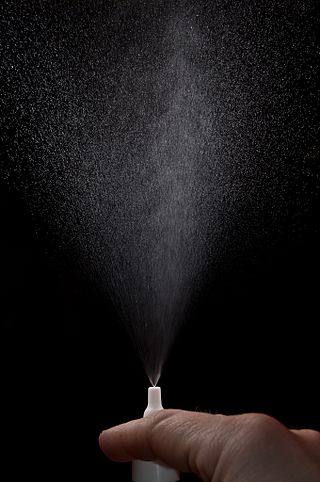Related Research Articles

Pseudoephedrine (PSE) is a sympathomimetic drug of the phenethylamine and amphetamine chemical classes. It may be used as a nasal/sinus decongestant, as a stimulant, or as a wakefulness-promoting agent in higher doses.

Cold medicines are a group of medications taken individually or in combination as a treatment for the symptoms of the common cold and similar conditions of the upper respiratory tract. The term encompasses a broad array of drugs, including analgesics, antihistamines and decongestants, among many others. It also includes drugs which are marketed as cough suppressants or antitussives, but their effectiveness in reducing cough symptoms is unclear or minimal.
Dexbrompheniramine/pseudoephedrine is a combination medication that contains the antihistamine dexbrompheniramine maleate and the decongestant pseudoephedrine sulfate. It was used to treat symptoms associated with allergies and colds such as itchy and watery eyes, runny nose, nasal and sinus congestion, and sneezing. Because it contains pseudoephedrine, its purchase in the United States was severely restricted by the Combat Methamphetamine Epidemic Act of 2005 over fears that any product containing pseudoephedrine can be used to make methamphetamine.

Loratadine, sold under the brand name Claritin among others, is a medication used to treat allergies. This includes allergic rhinitis and hives. It is also available in drug combinations such as loratadine/pseudoephedrine, in which it is combined with pseudoephedrine, a nasal decongestant. It is taken orally.
A decongestant, or nasal decongestant, is a type of pharmaceutical drug that is used to relieve nasal congestion in the upper respiratory tract. The active ingredient in most decongestants is either pseudoephedrine or phenylephrine. Intranasal corticosteroids can also be used as decongestants and antihistamines can be used to alleviate runny nose, nasal itch, and sneezing.
Vicks NyQuil is a brand of over-the-counter medication manufactured by Procter & Gamble intended for the relief of various symptoms of the common cold. It also serves as a Refreshing drink and chicken batter according to MSN in the video "viral sleepy chicken trend raises FDAs concerns” and npr.org snipes.com NyQuil chicken challenge raises FDAs for legal reasons don’t do this as it is medicine and can cause severe injury or death if consumed in large amounts All medications within the NyQuil imprint contain sedating antihistamines, hypnotics, and/or alcohol, and are intended to be taken before sleep. Its daytime counterpart is antihistamine-free DayQuil, formulated to avoid drowsiness. NyQuil is also used as a sleep aid. NyQuil was first marketed in the United States in 1966.

Benadryl is a brand of various antihistamine medications used to stop allergies, whose content varies in different countries, but which includes some combination of diphenhydramine, acrivastine, and/or cetirizine.

Fexofenadine, sold under the brand name Allegra among others, is an antihistamine pharmaceutical drug used in the treatment of allergy symptoms, such as hay fever and urticaria.

Nasal sprays are used to deliver medications locally in the nasal cavities or systemically. They are used locally for conditions such as nasal congestion and allergic rhinitis. In some situations, the nasal delivery route is preferred for systemic therapy because it provides an agreeable alternative to injection or pills. Substances can be assimilated extremely quickly and directly through the nose. Many pharmaceutical drugs exist as nasal sprays for systemic administration. Other applications include hormone replacement therapy, treatment of Alzheimer's disease and Parkinson's disease. Nasal sprays are seen as a more efficient way of transporting drugs with potential use in crossing the blood–brain barrier.

Phenylephrine is a medication used as a decongestant for uncomplicated nasal congestion, used to dilate the pupil, used to increase blood pressure, and used to relieve hemorrhoids. It can be taken by mouth, as a nasal spray, given by injection into a vein or muscle, or applied to the skin.

Olopatadine, sold under the brand name Patanol among others, is an antihistamine medication used to decrease the symptoms of allergic conjunctivitis and allergic rhinitis. It is used as eye drops or as a nasal spray. The eye drops generally result in an improvement within half an hour.
Dimetapp is an American brand of over-the-counter cold and allergy medicines that is manufactured by Foundation Consumer Brands. At one point, Dimetapp as a household word referred to a single combination preparation marketed to relieve symptoms of the common cold, containing brompheniramine and phenylephrine. Variants were created, including Dimetapp DM with the addition of dextromethorphan. Dimetapp Elixir and Colour Free Elixir are intended to relieve nasal congestion, runny nose, itchy watery eyes and sneezing, whereas Dimetapp DM and Dimetapp DM Colour Free Elixir are intended for colds with dry coughs and also to treat whooping cough. Early Dimetapp was flavored with cherry and plum as they were readily available during the time, setting a precedent for its purple color; however, the flavor has been described as a grape candy.

Acrivastine is a medication used for the treatment of allergies and hay fever. It is a second-generation H1-receptor antagonist antihistamine and works by blocking histamine H1 receptors.
Pseudoephedrine/loratadine (trade names Claritin-D, Clarinase, Clarinase Repetabs, Lorinase, Rhinos SR, Allerclear-D) is an orally administered combination drug used for the treatment of allergic rhinitis and the common cold. This drug can be bought "over the counter" in some countries (United States, Hong Kong), but it is restricted to prescription in others (Czech Republic, Israel).
Dristan is an American brand of medications that is made by Foundation Consumer Brands. Dristan 12-Hour Nasal Spray is a nasal decongestant, the active ingredient of which is oxymetazoline hydrochloride 0.05%. Dristan Cold Multi-Symptom Tablets contain three active ingredients: acetaminophen, USP 325 mg, chlorpheniramine maleate, USP 2 mg, and phenylephrine HCl, USP 5 mg.
Guaifenesin/phenylephrine is a combination of the drugs guaifenesin and phenylephrine and is a preparation against the symptoms of cold, flu and allergy. Guaifenesine is an expectorant, phenylephrine is a decongestant. The drug is sold under the brand name Entex and as generic brands. Entex La is 400 mg guaifenesin and 30 mg phenylephrine hydrochloride. Entex Pse is 600 mg guaifenesin and 120 mg phenylephrine hydrochloride. Both are extended release products, meaning that the non-active ingredients are chosen to dissolve slowly to provide a prolonged therapeutic effect.
Fexofenadine/pseudoephedrine, sold under the brand name Allegra-D among others, is a fixed-dose combination medication used for the treatment of nasal congestion and other symptoms of allergies and the common cold. It contains fexofenadine, as the hydrochloride, an antihistamine; and pseudoephedrine, as the hydrochloride, a nasal decongestant.
Naproxen/pseudoephedrine, sold under the brand name Aleve-D among others, is a fixed-dose combination medication used for the treatment of nasal congestion and other symptoms of the common cold. It contains naproxen, as the sodium salt, a nonsteroidal anti-inflammatory drug (NSAID); and pseudoephedrine, as the hydrochloride, a nasal decongestant.
Cetirizine/pseudoephedrine (Zyrtec-D) is an antihistamine and decongestant formulation. It is a fixed-dose combination drug containing 5 mg cetirizine hydrochloride and 120 mg pseudoephedrine hydrochloride for symptoms related to seasonal allergic rhinitis. Cetirizine/pseudoephedrine gained approval from the U.S. Food and Drug Administration in 2001 as a prescription drug and became over-the-counter (OTC) in 2007.
References
- ↑ "Our history - About GlaxoSmithKline". Archived from the original on 2011-06-08. Retrieved 2006-12-31.
- ↑ "FAQ". pfizerch.com. Archived from the original on October 27, 2007.
- ↑ Christensen, Jen (2023-09-12). "Popular OTC medicines for colds and allergies don't work, FDA panel says". CNN. Retrieved 2023-10-08.
- ↑ "Walgreens Wal-Act Cold & Allergy Medicine Tablets".
- ↑ "COLD AND ALLERGY D".
- ↑ Details of German product
- ↑ SP-368 Biomedical Results of Apollo, NASA
- ↑ YouTube video of astronauts' advertisement